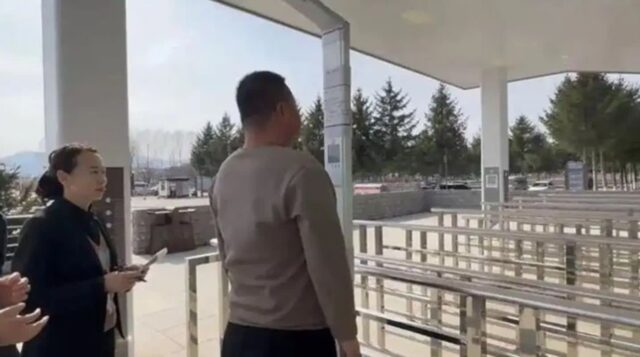|
According to a report by The New York Times (NYT) on the 4th (local time), China’s establishment of a rocket force and its drastic increase in the number of nuclear warheads are influenced by the trauma of the Korean War, during which a nuclear attack by the U.S. was considered.
◇ Xi Jinping immediately called for nuclear capacity enhancement, “the pillar of China’s status as a great power,” after taking office
Nineteen days after Chinese President Xi Jinping took office as the General Secretary of the Communist Party of China and Chairman of the Central Military Commission on November 15, 2012, President Xi demanded a substantial enhancement of nuclear capabilities from the generals of the Second Artillery Corps, a nuclear and conventional missile unit.
Xi Jinping stated that the Second Artillery Corps is “the column of China’s status as a great power” and ordered them to “develop strategic plans to respond to strong military intervention from enemies under the most complex and difficult conditions,” according to a summary of President Xi’s speech cited by the NYT.
|
◇ Xi Jinping scrapped the existing strategy of Deng Xiaoping and prior Chinese leaders’ analyzing China weakens if it spends too much energy on symbolic nuclear weapons.
Xi Jinping’s plan validates the relatively small number of nuclear weapons Chinese leaders have held since their first nuclear test in 1964 to threaten potential enemy countries that China could annihilate the enemy’s cities if they were attacked with nuclear weapons.
Deng Xiaoping, Chairman of the Military Commission, told Pierre Trudeau, the Prime Minister of Canada who visited Beijing, China, in 1983, “In the long run, China’s nuclear weapons are just a symbol,” adding, “If China spends too much energy on nuclear weapons, we will weaken ourselves.”
Sticking to Chinese leadership’s policy, China gradually increased nuclear weapons power along with conventional power from the 1990s, and by the time President Xi took office in 2012, China had about 60 Intercontinental Ballistic Missiles (ICBMs) capable of striking the U.S.
|
◇ Xi Jinping established a Rocket Force “Ordered to enhance nuclear deterrence and retaliation capabilities.”
Additional formation of at least 10 brigades, road, and railway missile launchers over several years.
However, President Xi began to enhance nuclear capabilities, ordering senior officers of the People’s Liberation Army at the end of 2014 to “have sharp weapons and maces that others would fear to protect ourselves,” In addition, the Second Artillery Corps, which was responsible for managing nuclear missiles, was reorganized and expanded into the Rocket Force in 2015.
At the inauguration ceremony of the Rocket Force, President Xi emphasized to the commanders that the task includes enhancing reliable nuclear deterrence and retaliation capabilities, i.e., the ability to survive the initial attack and retaliate with destructive force.
According to the China Aerospace Studies Institute (CASI), under the U.S. Air Force, the Rocket Force has added at least ten new brigades, equivalent to about a third of its forces, in recent years and added road and railway missile launchers to overtake U.S. detection technology such as satellites.
According to the Bulletin of the Atomic Scientists (BAS), China currently has about 500 nuclear warheads.
|
◇ China replaces over 200 conventional and nuclear warheads, capable of striking across Asia
The New York Times has analyzed that China’s military enhancements, such as missiles, submarines, and bombers, could pose a significant threat not only to cities on the U.S. mainland but also to U.S. military bases in Japan and Guam. China has the option to replace conventional warheads with nuclear warheads, and they possess over 200 Dongfeng (DF)-26 missile launchers, which could be used to strike targets across Asia.
Chinese state-run media outlets have conveyed the practice of replacing conventional and nuclear warheads of the Rocket Force and boasted of the dual role of this missile at military parades, which the NYT evaluated as a public scare tactic to intimidate competitors.
|
|
◇ China builds over 400 nuclear missile silos… Possesses 500 nuclear warheads
“China fear of vulnerability of national deterrence due to memories such as the Korean War where the possibility of dropping atomic bombs was implied.”
Despite this enhancement of nuclear capabilities, China has built about 110 nuclear missile silos underground in Hami, Xinjiang Uygur Autonomous Region in the west, and about 320 in the north since 2021 due to fear of being tracked by the more sophisticated U.S. satellites.
Chinese rocket engineers have demanded that silos be strengthened to protect missiles from precision attacks, arguing only then can China make a deadly counterattack when a nuclear attack occurs.
The NYT reported that China’s excessive fear of the vulnerability of its national nuclear deterrence is further strengthened by official historical records such as the Korean War, often covered by People’s Liberation Army research, in which U.S. leaders such as Douglas MacArthur, the commander of the UN forces, implied the possibility of dropping atomic bombs on China.
This memory has solidified the Chinese government’s view that the U.S. could use a nuclear threat.
















Most Commented